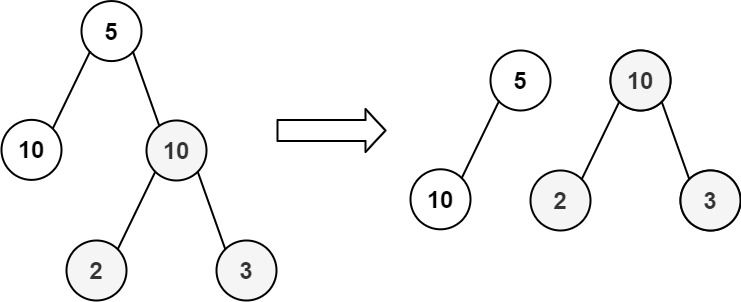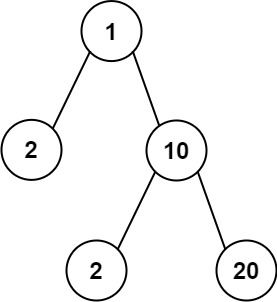Welcome to Subscribe On Youtube
663. Equal Tree Partition
Description
Given the root of a binary tree, return true if you can partition the tree into two trees with equal sums of values after removing exactly one edge on the original tree.
Example 1:

Input: root = [5,10,10,null,null,2,3] Output: true
Example 2:

Input: root = [1,2,10,null,null,2,20] Output: false Explanation: You cannot split the tree into two trees with equal sums after removing exactly one edge on the tree.
Constraints:
- The number of nodes in the tree is in the range
[1, 104]. -105 <= Node.val <= 105
Solutions
-
/** * Definition for a binary tree node. * public class TreeNode { * int val; * TreeNode left; * TreeNode right; * TreeNode() {} * TreeNode(int val) { this.val = val; } * TreeNode(int val, TreeNode left, TreeNode right) { * this.val = val; * this.left = left; * this.right = right; * } * } */ class Solution { private List<Integer> seen; public boolean checkEqualTree(TreeNode root) { seen = new ArrayList<>(); int s = sum(root); if (s % 2 != 0) { return false; } seen.remove(seen.size() - 1); return seen.contains(s / 2); } private int sum(TreeNode root) { if (root == null) { return 0; } int l = sum(root.left); int r = sum(root.right); int s = l + r + root.val; seen.add(s); return s; } } -
/** * Definition for a binary tree node. * struct TreeNode { * int val; * TreeNode *left; * TreeNode *right; * TreeNode() : val(0), left(nullptr), right(nullptr) {} * TreeNode(int x) : val(x), left(nullptr), right(nullptr) {} * TreeNode(int x, TreeNode *left, TreeNode *right) : val(x), left(left), right(right) {} * }; */ class Solution { public: vector<int> seen; bool checkEqualTree(TreeNode* root) { int s = sum(root); if (s % 2 != 0) return false; seen.pop_back(); return count(seen.begin(), seen.end(), s / 2); } int sum(TreeNode* root) { if (!root) return 0; int l = sum(root->left), r = sum(root->right); int s = l + r + root->val; seen.push_back(s); return s; } }; -
# Definition for a binary tree node. # class TreeNode: # def __init__(self, val=0, left=None, right=None): # self.val = val # self.left = left # self.right = right class Solution: def checkEqualTree(self, root: TreeNode) -> bool: def sum(root): if root is None: return 0 l, r = sum(root.left), sum(root.right) seen.append(l + r + root.val) return seen[-1] seen = [] s = sum(root) if s % 2 == 1: return False seen.pop() return s // 2 in seen -
/** * Definition for a binary tree node. * type TreeNode struct { * Val int * Left *TreeNode * Right *TreeNode * } */ func checkEqualTree(root *TreeNode) bool { var seen []int var sum func(root *TreeNode) int sum = func(root *TreeNode) int { if root == nil { return 0 } l, r := sum(root.Left), sum(root.Right) s := l + r + root.Val seen = append(seen, s) return s } s := sum(root) if s%2 != 0 { return false } seen = seen[:len(seen)-1] for _, v := range seen { if v == s/2 { return true } } return false }